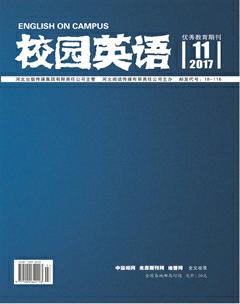Problems Found in English Articulation of Students in Olympic Garden School
劉海娟
【Abstract】Chinese learners are often influenced by their native language when they try to learn English phonology.Some of the influences may have a positive effect on learners and lead them to learn better, while it may also mislead the learners and have a negative effect.Chinese pronunciation habits may lead Chinese learners produce many kinds of errors when they learn the knowledge about consonants, vowels, stress, pronunciation and intonation.So what we should do is asking the students to do large quantity of oral and listening imitating practice according to the basic theories about English phonology.
【Key words】articulation; sounds; pronunciation; negative transfer
1. Introduction
Any language may have its own phonetic system and its own rules of articulation.They have different phoneme systems and vary a lot in their own properties. English articulation system is very different from Chinese pinyin, however, they have something in common.This is the reason why Chinese learners always have articulation problems when they speak English.So in the process of English teaching, we will try our best to decrease the negative influence according to the teaching theory.
2. The influence that Chinese have on English
When we learn the foreign language or the second language, we often talk about the influence of native language have on the second language.My students often associate their Chinese pronunciation habits with their English study, so this causes the wrong pronunciation in English articulation.The negative transfer can be found in the following examples:
2.1 Confusion of /f/and/h/
Some students have difficulty in pronouncing the sound of /f/and/h/.Chinese learners often confused with these two sounds.For example, they often say tou hua instead of tou fa.This is caused by the wrong pronunciation of glottal consonant/h/.In some Chinese learners phonetic system, they dont have glottal consonant/h/, so they use /f/ to replace it, or they replace /f/with /h/, which results in the wrong sounds of English articulation.
2.2 Mis-gliding /e/
When my students learn some words like wet, said, bread, they often pronounce them like/ wait/, /said/, /braid/.That is to say, they open their mouth too widely.Another reason is that, in pinyin, we cant find a similar sound to utter the vowel /e/, so many Chinese learners just use /ai/ to replace sound /e/, which results to the mis-gliding of the word containing these sound.
2.3 Confusion of /n/and/l/
Some students always get confused when they pronounce the words which has the sounds of nasal/n/and Chinese pinyin
/l/.When they want to say “know”, they say/l?u/ instead of
/n?u/;They read night as/lait/, name as/leim/. The reason is that there is no nasal sound in their dialect.They dont know how to make airflow to make sound in their nose.
3. How to solve these problems
For my students, it is important to solve these problems. First of all, I think that we should attach great importance on the articulation of English sounds.We should keep it in mind that the purpose of learning English is to use them and we should know the social communication function of English.Secondly, we should use effective learning strategies, especially the vowels.Thirdly, I think practice makes perfect.Only a large amount of practice can make Chinese learners pronounce English articulation well.The teacher should urge the students to do more imitation practice during the class or after the class.
4. Conclusion
It is very easy to confuse English vowels and consonants in the process of learning English, so it is important for us to ask our students to understand the essential points of articulatory regulations of different phonemes, as well as the places of articulation and the manner of pronunciation.We need to guide our students by training them in a scientific way and minimize the negative transfer of their native language.
References:
[1]外語(yǔ)教學(xué)與研究.1980(第二期).
[2]趙元任.語(yǔ)言問(wèn)題[M].商務(wù)出版社,1980,6.
[3]李庭薌.英語(yǔ)教學(xué)法,1983.
[4]董亞芬.大學(xué)英語(yǔ).泛讀[M].上海外語(yǔ)教育出版社.
[5]鄭桃云.淺談?dòng)⒄Z(yǔ)學(xué)習(xí)中的負(fù)遷移問(wèn)題,1999.
[6]蔣祖康.第二語(yǔ)言習(xí)得研究,1999.

